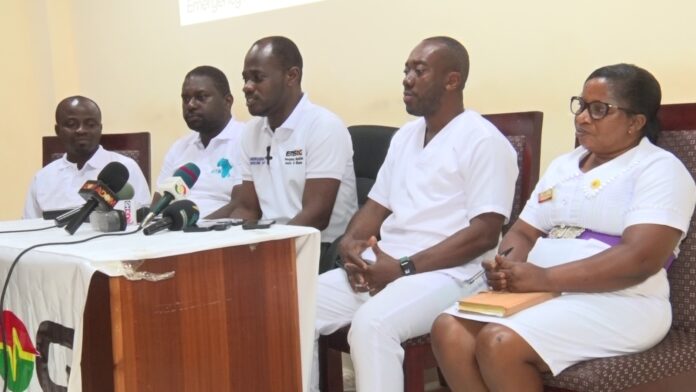
Emergency Medicine Practitioners are warning that health facilities in Africa; Ghana no exception could be overwhelmed if the debilitating effects of Climate Change is not properly handled.
The medics who are at the frontlines of handling victims of disease outbreaks, critical accidents and life threatening conditions in emergency wards point out that they are seeing increasing numbers of patients suffering from the effects of adverse weather conditions and climate disasters.
The Emergency Medicine Fraternity made the startling observations to mark this year’s Emergency Medicine Day which focuses on climate change as a health emergency.
A medic with the Komfo Anokye Emergency Medicine Unit and President of the Emergency Medicine Society of Ghana Dr. Daniel Osei Kwame enumerated a series of Climate induced factors which he fears could result in a further strain on already overstretched referral facilities.
He pointed out, “The impacts of climate change extend beyond direct health effects, permeating every facet of emergency medicine. We are witnessing an uptick in climate-related disasters, including floods, storms, and wildfires, which not only cause physical injuries but also overwhelm our healthcare infrastructure.”
“Climate change acts as a catalyst for the spread of infectious diseases, such as malaria, dengue fever, and cholera, as shifting temperatures create favorable conditions for vector proliferation and pathogen transmission.”
Climate Effects
Extreme weather conditions; poor air quality; violent storms; flooding; bush fires drought and extreme atmospheric heat being recorded across the world have been linked to climate change largely driven by the burning of fossil fuels and irresponsible human activity in the environment.
These harsh conditions have their attendant risks of extreme poverty; less food; scarcity of potable water; life threatening disasters; exponential spread of diseases and worsening health conditions.
Head of the Emergency Medicine Unit of the Komfo Anokye Teaching Hospital Dr Chris Oppong admitted that Ghana’s hospitals have begun experiencing a swell in admissions and hospital attendance as a result of these unfriendly weather patterns.
One thing we need to note is that as we have all these emerging conditions and all these patients, we should bear in mind that we don’t have so many doctors and specialists in our country to address all these injuries and sicknesses.
“If we are overwhelmed, there is not so much that we can do. You might come and not get the attention you desire because there are too many patients waiting to be seen,” he cautioned.
Deputy Chief Nursing Officer with the triage unit of the Komfo Anokye Teaching Hospital Emergency Department Georgina Adamtey reported on increase in diseases like malaria and respiratory conditions recorded at the hospital, linked with the shifting weather patterns.
Toll on Vulnerable Countries
Though Africa emits less than 4% of global greenhouse emissions; the continent together with other less developed countries, bear the biggest brunt of the effects of climate change.
A research conducted by the African Federation for Emergency Medicine which covered ten African Countries, revealed clear effects of climate Change and its resultant effects on both medical practitioners and health facilities
President for the African Federation for Emergency Medicine Dr Joseph Bonney told STARR/GHONE NEWS, “in all the countries, we identified that they had seen patterns that suggests that the changes in the climate is increasing what is happening in the hospitals.
HE TOLD REPORTER Ivan Heathcote – Fumador, “It is either directly affecting the health facilities in inadequate power supply to hospitals or disasters affecting the physical hospital structures or affecting the staff.”
Climate Action
Dr Bonney insisted it will take a conscious effort of both state and non-state actors to adopt clear climate adaptation and mitigation plans to build climate resilient health systems to stem the tide of the global climate crisis on health facilities.
“As a nation we need to build our infrastructure to be able to fight and withstand climate change. We need more hospitals, more disaster preparedness and more people who are trained within this space to manage emergencies and disasters,” he recommended.
The Emergency Medicine Physicians are confident painting the clear picture at the point where climate change and health care meets; will prick the conscience of both state and non-state actors, civil society and the general public; to begin fashioning out climate mitigation and adaptation measures for a safer and healthier world.
Source:Ghana/starrfm.com.gh/Ivan Heathcote – Fumador

